

































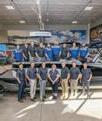







Al
AustinCuka@SpotlightMediaFargo.com
Matt
ClientRelations@SpotlightMediaFargo.com
Jasmine































































Al
AustinCuka@SpotlightMediaFargo.com
Matt
ClientRelations@SpotlightMediaFargo.com
Jasmine





















he world of artificial intelligence can feel intimidating. The headlines are packed with phrases like “machine learning,” “neural networks,” and “automation,” often accompanied by warnings about job displacement or the next tech disruption. For those running businesses—especially small to midsize ones—it’s easy to feel both intrigued and overwhelmed.
I’ll be the first to admit I’m no AI expert. But like many of you, I’m paying attention and I'm definitely using it to help me at work.
In recent months, I’ve spoken with business owners who have used AI tools to save time, spot trends, and simplify operations.
Still, as we inch further into this new frontier, I think it’s worth asking what the cost of efficiency is if it chips away at what makes us human?
To this point in human history, the businesses that have managed to succeed are the ones that are able to connect with customers on a deeply personal level. Are we sure that will change?
You do business with the people who remember your name, write you thoughtful notes, and who answer the phone with warmth. AI can crunch data and generate content, but it can’t replace genuine care, lived experience, or intuition. It can assist with decisions, but it can’t build trust. At least yet.
The challenge—and the opportunity—is learning how to use AI not as a crutch, but as a tool. One that frees us up to do the things that have always helped us succeed—telling stories, building relationships, and solving problems creatively.
Bis-Man INC! Editor


ome firms chase trends, while others build legacies. Endeavor North Design, PLLC falls decisively into the latter. This full-service architectural firm and owner’s representative delivery model is guiding people through some of the most pivotal journeys of their lives.
For founders Cole Johnson and Nate Hacker, architecture is as much about relationships as it is about crafting environments that enhance the lives of the users. It’s about meeting clients where they are—often over a casual cup of coffee—and helping them navigate the unfamiliar terrain of design, construction, and transformation. They listen, advise, and craft spaces that reflect the heart and soul of a community.
When entrepreneurs of new start-ups or existing businesses, higher education, K-12, healthcare systems, or civic leaders come to Endeavor North Design, they’re not simply seeking walls and windows. They're searching for guides who can help them make sense of complex decisions, manage intricate processes, and ultimately, create something that will stand the test of time.
From billion-dollar hospital campuses to local storefront revitalizations, Johnson and Hacker have spent over 30 combined years walking alongside clients on these highstakes journeys. And yet, they know that for many of their clients, this may be a once-in-a-lifetime endeavor.
“We see ourselves as more than architects,” Johnson said. “We’re collaborators, translators, problem-solvers, and often, the calm voice in what can feel like an overwhelming process. For a lot of our clients, this is a
Nate Hacker Registered Architect


Cole Johnson Registered Architect

BY BRADY DRAKE

Hockey dryland training, skating treadmill, and synthetic ice for year round performance training

journey into the unknown—and we’re here to guide them every step of the way.”
That’s no accident. It’s embedded in the firm’s name. To endeavor is to embark on something bold and new, and Endeavor North Design exists to make that leap feel less daunting—and even exciting.
The firm’s strength can be found in the complementary talents of its founders. Johnson, an architect with a passion for design, visualization, and creating interactive experiences, thrives on the creative spark that ignites in the earliest phases of a project.
“I love helping clients visualize their space—seeing them walk through 3D models and truly understand what we’re creating together,” Johnson said. “It’s about making the abstract tangible.”
Hacker, by contrast, is wired for process, precision, and the often-overlooked complexities that ensure a project’s success. With a background that spans architecture, project management, and even construction, he relishes the organizational side of the work—balancing budgets, schedules, and logistics with mastery.
“Architecture is part art, part science,” Hacker said. “And where some architects lean only into the art, I find a lot of joy in the science—the delivery, the nuts and bolts of bringing a vision to life on time, on budget, and minimal surprises.”

Together, they form a rare balance—each leaning into their strengths which enhances the client experience.
“We see our clients we've worked with around town,” Hacker said. “We see their businesses thriving in spaces we helped them create. We see them at youth sporting events and coffee shops. To us it is about creating friendships and lasting relationships. That’s the legacy we care about—the lasting impact of our work on the people and the place we call home.”
This deep-rooted community connection is reflected in the firm's civic engagement. Both founders are actively involved in local boards, school PTOs, youth sports, and volunteer leadership.
The goal at Endeavor North Design is to remove uncertainty in the process and replace it with clarity, collaboration, and confidence. They guide clients through every step, from feasibility studies and site selection to masterplanning, construction administration, and owner’s representative services.
Whether it’s aligning scope, schedule, and budget in the early stages or navigating the complexities of bidding, negotiations, and construction administration, the firm works to achieve responsive communication, transparent processes, and a steady hand, turning challenges into opportunities. And perhaps most importantly, they strive to make the process enjoyable.
“Projects can last two, sometimes three years,” Hacker said. “If it’s not fun along the way, we’re missing the point. We want our clients to feel energized, supported, and yes—have some laughs in the process.”








he Bismarck Public Schools (BPS) Child Nutrition Department plays a pivotal role in the health and well-being of their students, serving approximately 13,000 meals daily across 27 sites. With over 100 dedicated staff members operating in 24 buildings across the district, the BPS Child Nutrition Department ensures that students enjoy nutritious meals. Furthermore, they support local agriculture through the BPS Farm to School program, partnering with eight local producers and a local beef rancher.
Candidates must possess a high school diploma or equivalent. While previous kitchen experience is beneficial, it is not required, as on-the-job training will be provided. The positions are fast-paced and active, involving tasks like standing, walking, and lifting, making the day fly by.
Eligible employees (working 20-40 hours per week) will enjoy a competitive benefits package, which includes personal days, sick leave, paid holidays, as well as health, dental, and vision insurance, alongside retirement benefits. Detailed information about the benefits can be found on their website at bismarckschools.org
Working in school nutrition is not just a job; it's an opportunity to grow in a fulfilling career where you can make a significant impact on students' lives. For many students, the meals you serve may be the most substantial they receive all day.
BPS is currently seeking enthusiastic individuals to join their team in various capacities:
6 - 8 hour shifts
These roles are crucial in meal preparation and cooking. Responsibilities include serving lunch and performing end-of-day clean-up.
4 - 5.5 hour shifts
Ideal for those who can cover breaks and assist with meal prep and serving. This role involves minimal cooking.
2 - 3 hour shifts
Perfect for individuals looking to assist with last-minute preparations, serving, and clean-up.
*Middle and high school positions will require cashiering. *All new hires will receive comprehensive training, ensuring you are well-prepared for your role.
These positions closely align with the school calendar, making them ideal for parents with children in the district!
If you are looking for a meaningful career that offers both flexibility and the opportunity to make a difference in children's lives, consider joining the BPS Child Nutrition Department. Visit their website to learn more and apply directly. Be part of a team that nourishes the children of our future every day!



*This institution is an equal opportunity provider.


By



ctober 2024, Casey Neumann, a seasoned businessman did something he doesn't recommend—he made the emotional decision to purchase a business he didn't want to go out of business.
The business in question was West Dakota Meats, a company that has served Bismarck area hunters, ranchers, and local families for over
five decades. Prior to Neumann stepping in, the shop was nearing its end. After 54 years in business, the original owners were winding down, reducing hours, scaling back inventory, and preparing for closure.
“I found out they were closing,” Neumann said. “I didn’t want to see one less option out there. I’ve been a hunter and fisherman since I moved here in 1995, and I used to take my venison to West Dakota. That place mattered.”
In just two weeks, Casey made the acquisition—a decision born of both heart and instinct.
“Emotionally driven? Absolutely,” he said. “Which wasn’t the smartest thing in the world. But I couldn’t let it go.”
But buying a business in decline is easy compared to turning one around. The real work began the day he signed.


Casey’s transition from Ford dealership executive to meat shop owner was hardly typical. He brought with him 24 years of customer service expertise, having served in roles from Finance Director to General Sales Manager at Eide Ford. That background instilled a
commitment to people—the kind of commitment that sees the long game and invests in trust.
“I’m more behind the scenes now— handling admin, jumping in when things go sideways,” Neumann said. “But this is about the employees— they’re the future of this business.”
That future is literally family. Casey’s 18-year-old son Brock—who will be studying business and finance— is learning the ropes through

full immersion. He is managing expenses, stocking meat counters, working after school and weekends, and learning hard truths about cash flow.
“He came to me and said, ‘Dad, we’re not making any money.’ And I told him, ‘Yes—I’m fully aware.’ It takes time,” Neumann said.
The team also includes Neumann's son-in-law Tyler and their longtime friend and butcher Ivan, who



returned after a 30-year career in the industry. Together, they’ve built a nucleus of trust and know-how.
“They run the day-to-day,” Neumann said. “I’m just the janitor now.”
Since taking ownership, "the janitor" and his team have restored the fresh meat counter, expanded the jerky line—including new pork loin-based flavors—and reintroduced field slaughter services to serve local ranchers directly.
The jerky, in particular, has become a customer favorite—not just for its flavor, but for its unbeatable price point. “We offer it at about $14 a pound,” Neumann said. “Compare that to the $40 or $50 per pound
convenience store stuff, and people start doing the math.”
The broader goal? To return West Dakota to its former glory while modernizing its operations with a remodel, new signage, and a renewed customer experience that rivals leading butcher shops in the region.
That said, it hasn’t been without hurdles.
“Staffing has been the biggest challenge,” Neumann said. “You need someone to wait on customers. You need people showing up every day.
That’s where Gena came in. Casey’s wife—and the head of HR for both
West Dakota Meats and Pure Dakota—rolled up her sleeves and got to work. With a background in hiring, culture, and people management, she brought structure to the chaos.
“She’s been a rock through all of it,” Casey said. “We weren’t just looking for warm bodies—we needed the right people who understood what this place stands for.”
After months of long days and hard calls, the team started to click. Now, West Dakota is staffed with a tight-knit crew that has the kind of work ethic you can’t teach. They’re committed to doing what’s right for their customers and their community. That’s the West Dakota difference.

Ivan brings 30 years of butcher experience to West Dakota Meats.
“Even small gestures—an extra package of jerky, a handshake, a genuine thank you—go a long way,” Neumann said.
While West Dakota is Casey’s latest venture, it is by no means his first rodeo. Years earlier, in 2018, Casey became one of the founding figures behind North Dakota’s first licensed medical marijuana operation Pure Dakota and Pure Dakota Health.
“I was working at Eide Ford at the time,” Neumann. “Then my partner,


Dave Meyer, approached me about managing operations for the state’s first medical marijuana license. I left Ford on August 1, 2018. That same day, Pure Dakota was born.”
It’s a two-pronged business—Pure Dakota is the cultivation facility where products are grown and created. Pure Dakota Health is the dispensary, with locations in Bismarck, Williston, and Fargo.
“We have over 200 standard operating procedures at the cultivation facility alone,” Neumann said. “You don’t freelance in an industry like this. You follow the protocol exactly.”
Launching the venture required
immense coordination, from building a C1D2-rated lab for extracts to recruiting experts like a double PhD chemist from Massachusetts.
“We worked with consultants early on,” he said. “But after that first year, we switched into North Dakota mode: head down, figure it out.”
What followed was a strategic hiring spree, pulling in smart, blue-collar talent—HVAC techs, mechanical wizards, and small-town workhorses.
“It’s physically demanding work,” Neumann said. “But they treat it like family. Honestly, I couldn’t imagine a better crew.”
CONTINUED



Compliance may drive the operation, but empathy shapes the culture.
“In the cannabis space if something goes wrong, our team knows step one is to empathize," Neumann said. "Step two is to document it. Step three is to fix it.”
Despite their vast differences, West Dakota and Pure Dakota share a few crucial things in common.
• structured processes
• family-style leadership
• old-school respect for relationships
Through it all, Neumann's long-term aspiration is to step back, support his kids, and maybe, just maybe, mow the greens at Riverwood Golf Course.
“I still enjoy physical work,” he said. “But at some point, you have to delegate. Let the next generation learn what you can’t teach in a classroom.”
Whether he’s skinning deer on a cold North Dakota weekend or navigating a complex web of cannabis regulations, Casey Neumann will be sticking to his principles with both businesses.
“I’ve got customers walking into West Dakota Meats now who haven’t been here in 20 years,” he said. “But they see us, they know what we stand for, and they give it another shot. That means everything.”
westdakotameatsnd.com /WestDakotaMeats
puredakotahealth.com
/puredakotahealth @puredakotahealth /company/pure-dakota-health
puredakotand.com
/pure.dakota @pure.dakota



There’s something truly magical about watching the faces of a community come into focus. Behind every storefront window, every buzzing office, every late-night light glowing in a studio or workshop—there’s a story. A dream. A person who decided to build something right here in Bismarck-Mandan.
Our annual sister publication, Faces of Bismarck-Mandan, is a celebration of those individuals— the small business owners, the risk-takers, and the service leaders. They are the heartbeat of this community, and through these pages, we’ve aimed to honor them as they deserve to be.
We've published this magazine every year since 2021, so, we thought now would be the perfect time to take a look back at some of our past features as we get ready to put together the 2025 issue!
30,000 issues printed
12,000+ impressions of the digital issue alone
Hundreds of people featured READ THE ISSUE HERE!

In 2021, we launched our inaugural Faces of Bismarck-Mandan publication after putting out our very first Faces of publication in Fargo-Moorhead-West Fargo earlier in the year. In this issue we learned about so many amazing businesses (58 different ones to be exact!)
























































READ THE ISSUE HERE!

In a world flooded with pop-up ads and quick-scroll content, we make sure that we are different. These Faces publications are made with quality so that they can serve as coffee table books throughout the year!
We continued this trend in 2022 to continue elevating entrepreneurs, professionals, and visionaries.We don’t just list business names, we tell their stories while capturing their images in stunning portraits.





















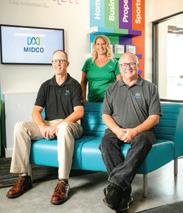
































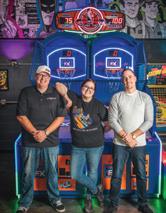

READ THE ISSUE HERE!

In the 2023 edition, like those before it, we worked to capture the unique spirit of Bismarck-Mandan. We worked to reflect the innovation, diversity, and determination we see every day.

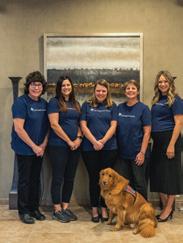











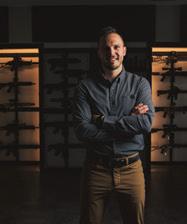




































Want a Faces Feature?
If you’re looking back on these past issues and thinking, 'This could be me,' you’re absolutely right. The next edition of Faces of Bismarck-Mandan is already in motion—and we’d love to feature you!
If you're interested, reach out to info@spotlightmediafargo.com READ THE ISSUE HERE!




















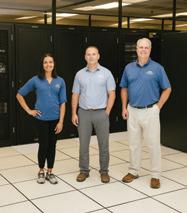




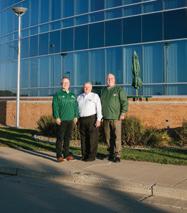






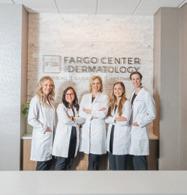




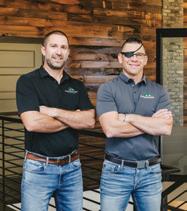
















by Michael Warren

The North Dakota Women’s Business Center (NDWBC) is dedicated to empowering women entrepreneurs and business professionals across the state. Through expert-led training, one-on-one business advising, and a strong network of support, NDWBC provides the tools and resources necessary for women to start, grow, and succeed in business. Whether launching a startup, expanding an existing enterprise, or developing leadership skills, NDWBC fosters an inclusive environment that champions innovation, resilience, and economic growth. By connecting women with mentorship, funding opportunities, and strategic guidance, NDWBC plays a vital role in shaping a thriving business community in North Dakota.
By Christy Dauer
Director, North Dakota Women's Business Center
the dynamic world of small business, understanding your clients and customers is paramount. At NDWBC, we believe that asking the right questions can unlock valuable insights, foster stronger relationships, and drive business growth. Our team of business coaches support small businesses every day by challenging our clients to think about asking their customers the right questions and seeking valuable feedback to enhance their strategies and services.
Way back in my concession stand days, I learned to value the importance of understanding customer demand. I paid a portion of my college tuition selling Cloverdale Hot Dogs for $1; in fact, I graduated with no student debt. When Friday night race fans requested a
new item, I would eagerly add the ingredients to my very next week's delivery. Then, carefully place each letter on the menu board to ensure readability.
Friends... this was back in the letter days where you added them plastic letter by letter, trying to balance them out to be equidistantly spaced, and then realized you made a spelling error and had to pull each painful one back out, haha. This process created added demands on our fryers, cooler space, and prep tables. Of course, it didn't end there, updating the tills correctly and informing my front staff of the new item— the added touch points continues. Fellow managers, I hope you can relate. As a result, some Friday night features turned quickly into menu flops, leading to waste and reduced profit margins, which were already tight. This experience taught

me to question whether a new item would appeal to many customers or just one. This example is relevant as we think about customer discovery within business, and I'd argue that it's even more important now to know the needs and wants. And the capacity to pay for your product or service. By engaging with our customers, we can tailor our services to meet their needs and exceed their expectations.
Asking questions is not just about gathering information; it's about building trust and showing that we care about our customers' experiences. When we ask questions, we demonstrate our commitment to understanding their needs, preferences, and pain points. This practice helps us identify areas for improvement, innovate our offerings, and ultimately deliver a better customer experience. Don't worry, I have lots to say about customer service, circle back to March's article for more.
Moreover, asking questions can reveal hidden opportunities and insights that might otherwise go unnoticed. It allows us to stay ahead of market trends, anticipate customer demands, and make informed decisions that
benefit both our business and our clients.
Our team often recognizes a variety of tools and methods to gather customer feedback:
These are excellent tools for collecting structured feedback, think of the fishbowl by your register or a series of questions to share with your email list. Remember to keep the surveys easy to complete and cover key aspects of services. Tools like SurveyMonkey (if you don't mind ads, it's free!) and Google Forms are particularly useful for creating and distributing surveys.
Common questions could be: Overall Satisfaction, Product/ Service Quality, Rate our Customer Service, Value for the Money, Likelihood to recommend, or simply ask what do you wish we offered? In fact, I have helped mutliple clients with the power of AI come up with brilliant survey questions.
Conducting one-on-one interviews, have you
considered asking your customers why they chose you? This method provides qualitative insights that can be invaluable for understanding complex issues and identifying specific areas for improvement.
Platforms like LinkedIn, Facebook, and Instagram offer opportunities to interact with customers in real-time. Have you asked for feedback on your social media? Yes, I agree this can often open up for negative comments, but it can also open the door to hear who is actively following you and how they are willing to spend their disposable income. If they don't like something you are selling/ offering, consider what their feedback is and how you might adapt.
I know asking openended questions on social media might be scary, so, how about placing feedback forms on your website or QR codes in your physical locations to encourage customers to share their thoughts at their convenience? We implemented this on NDWBC's website, and with absolutely no advertising, have tipped the scales at over 750 responses, with data that drives our decisions.

Utilizing tools like Google Analytics helps track customer behavior on our website, seriously, this is a game changer on where to focus your energy if your goal is revenue growth. This data provides insights into what customers are looking for, how they navigate your site, and where to improve their experience.
Asking questions is a powerful tool for any small business. At NDWBC, we are committed to continuously engaging with our clients to understand their needs and enhance our services. By leveraging effective tools and methods, we gather valuable feedback, build stronger relationships, and drive small business and economic growth. I wholeheartedly believe the key to success lies in listening to your customers and acting on their feedback. Let's continue to champion the importance of asking questions and focus on revenue growth opportunities by simply asking and listening.
Follow NDWBC
ndwbc.com /ndwbc @ndwbc
/company/north-dakotawomen-s-business-center


or the first time in history, TEDxFargo will be held over two-days, giving attendees the option to experience one day or both. Each day will offer a unique lineup of speakers, ideas, and energy.
Imagine a world woven together by ideas, experiences, and connections— where every thread holds meaning, linking past to present and possibility to reality. At TEDxFargo Thread, we invite you to explore the intricate fabric of innovation, creativity, and human connection.
On July 23 and 24, step into a space where ideas intertwine, where bold thinkers and dreamers pull at the threads of curiosity, challenge perspectives, and create something entirely new. This year, unravel the unseen patterns that shape our world, illuminating the hidden connections between disciplines, communities, and individuals.
Come to TEDxFargo, where stories intersect, where possibility is stitched into reality, and where every thread leads to a future yet to be woven.
In the spirit of ideas worth spreading, TED has created a program called TEDx. TEDx is a program of local, self-organized events that bring people together to share a TEDlike experience. This event is called TEDxFargo, where x = independently organized TED event. At the TEDxFargo event, TEDTalks video and live speakers will combine to spark deep discussion and connection in a small group. The TED Conference provides general guidance for the TEDx program, but individual TEDx events, including this one, are selforganized.
TED is a nonprofit organization devoted to Ideas worth spreading. Started as a four-day conference in California 30 years ago, TED has grown to support its mission with multiple initiatives. The two annual TED Conferences invite the world’s leading thinkers and doers to speak for 18 minutes or less. Many of these talks are then made available, free, at TED.com. TED speakers have included Bill Gates, Jane Goodall, Elizabeth Gilbert, Sir Richard Branson, Nandan Nilekani, Philippe Starck, Ngozi Okonjo-Iweala, Sal Khan, and Daniel Kahneman.




Founder & Executive Chef, Wok Star Inc.
Katie Chin is an award-winning cookbook author, television chef, playwright, caterer, and Culinary Ambassador to the National Pediatric Cancer Foundation. A recognized expert in pan-Asian cuisine, she’s dedicated to showing that delicious Asian dishes can be made by real people in real kitchens.
Forbes, O Magazine, and Bon Appétit. Her television appearances include The Today Show, Iron Chef America, Beat Bobby Flay, and Chopped.
/ChefKatieChin
@chefkatiechin
@chefkatiechin
/katie-chin-a53600a


/7GenerationGames
@7gengames
/7-generation-games
/annmaria-de-mars-3549606/
After growing up in the kitchens of her late mother Leeann Chin’s acclaimed Minneapolis restaurants, Katie pursued a career in entertainment marketing before returning to her culinary roots. She has co-hosted the PBS series Double Happiness, written five cookbooks—including the bestselling Everyday Thai Cooking and Katie Chin’s Global Family Cookbook—and has been featured in top publications such as
Katie is also a passionate advocate for healthy cooking as a means of cancer prevention, frequently demonstrating recipes on Bloom TV with pediatric cancer warriors. She brings her creativity to the stage as well, performing her one-woman show Holy Shitake: A Wok Star is Born in sold-out theaters nationwide. Based in Los Angeles, Katie runs Wok Star Catering, leads her IG Live series “Small Bites with Chef Katie Chin,” sings in a band with her husband, and raises her teenage twins—all while serving on multiple philanthropic boards and championing the AAPI community.
Author & President, 7 Generation Games
Dr. AnnMaria Rousey De Mars is a serial entrepreneur, educator, author and was the first American to win the world judo championships. She is president of 7 Generation Games, a tech startup she co-founded. She was one of Forbes 40 Women to Watch over 40, the first woman to serve as president of national judo organization and an AARP Purpose Prize Fellow. She authored a book on techniques for judo and MMA fighters and articles in academic journals on topics ranging from factor analysis to needs of rural educators in schools serving Indigenous students.
Dr. De Mars has taught math from 5th grade through doctoral students and at public, private and tribal colleges. She has been the lead developer on 14 educational games, including Making Camp Lakota, Making Camp Ojibwe, and Spirit Lake: The Game. She was Principal Investigator of the Growing Math project, providing curriculum to teach Indigenous history, mathematics, and agricultural science. She has four children and nine grandchildren.


With a career spanning 45 years in the Rural Electric and Telecommunication industries, Vern’s leadership reached its pinnacle as President and CEO of National Information Solutions Cooperative (NISC) from 2002 to 2020. Under his guidance, NISC grew into a leading information technology company, providing innovative accounting, billing, and engineering software to over 860 electric cooperatives, telephone companies, municipalities, and broadband providers across all 50 states, American Samoa, Palau, and Canada. Vern was inducted into
Vern Dosch
/vernon-dosch-8589879a

the National Cooperative Hall of Fame at the National Press Club in Washington, D.C.
Vern Dosch and his wife, Lynne, have celebrated 41 years of marriage and are the parents of two sons and a daughter, as well as the grandparents of nine grandchildren.
Vern is a graduate of the University of Mary, where he earned degrees in Business and Accounting, as well as a master’s in management. Additionally, he holds an Honorary Doctorate in Leadership.
National Information Solutions Cooperative /nicsolutions





/DeloitteUS
@deloitte
/deloitte
/deborah-golden

Deborah Golden thinks differently. Wired for the unconventional, she transforms bold ideas into industryshaping realities. As Deloitte’s Chief Innovation Officer, Deborah leads at the forefront of technological advancement, tackling challenges and crafting transformative solutions that empower organizations forward in a rapidly evolving world.
A lifelong pioneer, Deborah consistently redefines what’s possible through her unique ability to connect ideas, people,
and technologies in unexpected ways. From her leadership in Deloitte’s Cyber & Strategic Risk and Cyber Strategic Growth Offering to her current work driving innovation across the marketplace, she thrives on turning disruption into demonstrable opportunity—creating value at every step of the way. Drawing on personal experiences of resilience, Deborah embraces adaptability and mental antifragility, inspiring others to harness change and complexity to create lasting impact.

Missy founded BIO Girls in 2013 and has served as CEO since. Before making it her full-time role in 2018, she spent 15 years in the tech industry as a consultant and marketing leader. Under her leadership, BIO Girls has grown from a local program impacting dozens of girls to a regional nonprofit serving thousands annually. She has scaled the organization through controlled growth and innovation while fostering a workplace culture of balance and family-first values.
BIO Girls
/BIOGirlsInc
@biogirlsinc
/bio-girls
A mom to three daughters and wife to Tom, Missy loves adventure with her family, traveling, mountain biking, running, Ironman triathlons, and hiking. She is also an avid fan of professional track and field, the MN Vikings, her kids’ activities, and her cat, Harry. Missy was a four-time All-American in track at UND (’01), earning degrees in Exercise Science and Nutrition. As a recipient of an NCAA postgraduate scholarship, Missy completed an MBA degree from NDSU (’04).
Missy Heilman
/missy.heilman
@mheilman77
/missyheilman


Hemma Wellbeing
/hemmawellbeing
@hemmawellbeing

Randi is a holistic wellness practitioner that uses seasonal living, body awareness, and intuitive self-care to help people navigate their healing journey with confidence so they can create a rhythm of wellness that feels accessible and deeply supportive for themselves and their family. Her business Hemma Wellbeing integrates abdominal massage, therapeutic yoga, herbalism, and nature-based lifestyle practices through 1:1 sessions and group retreats. She also offers education and insights online through her essays and
podcast The Home Practice.
Beyond individual healing, Randi is passionate about the broader connection between personal wellness, community building, and entrepreneurship. She believes that nurturing oneself is the foundation for nurturing strong communities and thriving businesses and supports small business owners, nonprofits, and leaders as they navigate the highs and lows of following their dreams.


Imagine a world where the impossible becomes possible, where innovation transforms dreams into reality. This is the world Joel Honeyman envisions every day in his role as Vice President of Global Innovation at Bobcat Company. He often describes his role as making the unbelievable believable. He and his team champion Bobcat’s mission of empowering people to accomplish more every day as they identify ways to solve customers’ toughest challenges.
Joel Honeyman
/joel-honeyman
From leveraging emerging technologies to creating entirely new solutions, Bobcat is creating the jobsite of tomorrow. These efforts have positioned Bobcat at the cutting edge of the industry, earning prestigious accolades such as Fast Company’s 2023 World Changing Ideas Awards and multiple CES® Innovation Awards.
By making the unbelievable believable, Joel envisions a future where anything is possible.
Bobcat Company /BobcatCompany @bobcatcompany /bobcat-company




Chloé Valdary is an artist, writer, and founder of the Theory of Enchantment. ToE (pronounced DAO) is an organization that facilitates trust, inclusion, and belonging in organizations by teaching love and harmony.
Chloé received her Bachelor's in international studies with a
Chloé Valdary
/chloe.valdary
@cvaldary
/chloe-valdary-92426565


concentration in conflict and diplomacy from the University of New Orleans. She has been published in the WSJ, the New York Times, and the Atlantic Magazine, and has also produced music for the past 7 years. In her spare time, she enjoys bird watching, reading, and DJing.
/theoryofenchantment
@theoryofenchantment
/theory-of-enchantment
Kim is the Chief Innovation Leader and National Managing Director of The Deloitte Greenhouse® Experience group, which helps executives tackle tough business challenges through immersive, facilitated lab experiences, and client experience IP such as Business Chemistry®. As part of this role, Kim leads US Deloitte Greenhouses, permanent spaces designed to promote exploration and problem solving away from business as usual.
Kim is the architect and global leader of Deloitte's proprietary working style system, Business Chemistry®,
used by more than 300,000 people around the world, co-author of the Harvard Business Review cover story on Business Chemistry and the book "Business Chemistry: Practical Magic for Crafting Powerful Work Relationships" with Deloitte Greenhouse colleague Suzanne Vickberg. Kim and Suzanne’s second book, "The Breakthrough Manifesto: Ten Principles to Spark Transformative Innovation", digs deep into methodologies and mindsets to help obliterate barriers to change and ignite a whole new level of creative problemsolving.


Link Ventures
/linkventures
link-equity-partners-llc

John Werner is a successful serial entrepreneur, investor in technology startups, and mentor. He has created a career out of bringing ideas, networks, and people together to generate powerful results. John is a Managing Director and member of the investment committee at Link Ventures. Link Ventures raised $130 million in their LV3 fund and is working with earlystage entrepreneurs to support their great ideas.
Before joining Link Ventures, John’s deep curiosity and penchant for problem-solving led him to a diverse set of roles spanning many fields and interests. Previously, John was a VP at Meta, a Y Combinator augmented reality startup based in Silicon Valley. John also served as the Head of Innovation and New Ventures at MIT's Camera Culture Group and the Managing Director of Emerging Worlds SIG, where he led the launch of collaborative innovation centers in Mumbai, Nashik, and Hyderabad.


Jenn Dice is a high-impact leader with a strong track record across the non-profit, outdoor, and bike industry sectors. Known for building powerful networks and assembling top-tier teams, Jenn excels at designing and executing meaningful initiatives and programs at the local, state, and federal levels.
With deep experience in government advocacy and nonprofit leadership, she is skilled at balancing longterm vision with short-term wins. A fearless fundraiser, dynamic speaker, and energetic changemaker, Jenn is passionate about creating environments where real, lasting change can thrive.




Edward F. O’Keefe was born and raised in Grand Forks, North Dakota (go Rough Riders!) He is currently the CEO of the Theodore Roosevelt Presidential Library Foundation.
Previously, he spent two decades in broadcast and digital media at ABC News, CNN, and NowThis, during which time he received a Primetime
Edward O'Keefe
@edwardokeefe @edwardokeefe /edwardokeefe


/melissa.b.mork
@dr.melissa.mork
@dr.melissa.mork
Emmy Award for his work with Anthony Bourdain, two Webby Awards, the Edward R. Murrow Award, and a George Foster Peabody Award for ABC’s coverage of 9/11.
A former fellow at the Harvard Kennedy School, he graduated with honors from Georgetown University.
Theodore Roosevelt Presidential Library Foundation /TRPresidentialLibrary /trlibrary
Dr. Melissa Mork is a professor of psychology, criminal justice, and law enforcement with advanced degrees in clinical and forensic psychology. She specializes in mental health, grief, and crisis recovery, offering interventions for survivors, families, and first responders impacted by mass shootings. She researches and teaches folks in high-stress professions like law enforcement and healthcare how dark humor can help them stay human (especially in inhuman situations).
After being widowed, she wrote "Navigating Grief with Humor" (2019),
"Bounce" (2023), and "Mental Health Matters" (2024). She has contributed to forensic journals, humor publications, and even Chicken Soup for the Soul (because sometimes science and soup go together).
Melissa is a Certified Humor Professional (yep, that’s a thing) and grief specialist. She once competed for Minnesota’s Funniest Person. She didn’t win, but she was the only contestant who could diagnose the judges.



/emily-puetz-42778614


University of North Dakota
/UofNorthDakota
@uofnorthdakota
@UofNorthDakota
/uofnorthdakota
Emily Puetz is a strategist, systems thinker, and lifelong learner working at the intersection of innovation, education, and regeneration. As cofounder of Ideas2Impact, she helps schools, nonprofits, foundations, and government agencies across the U.S. and New Zealand design transformative learning environments and navigate complex change.
With over 30 years of experience, she’s led initiatives from launching new school models, building a new education leadership talent pipeline for the state of MN, to mentoring student-
led ventures with Google engineers. Her work spans strategic planning, change management, organizational development, and leadership coaching for over 50 learning institutions and social impact organizations.
Emily lives in Boulder, Colorado, with her husband and two daughter,s who recently returned from living in New Zealand, where natural systems and permaculture principles continue to influence her thinking about how we grow thriving, regenerative ecosystems around the planet.
Andrew P. Armacost began his tenure as the 13th President of the University of North Dakota on June 1, 2020, following a distinguished career in the U.S. Air Force, where he retired as a Brigadier General after serving as Dean of the Faculty at the U.S. Air Force Academy. Under his leadership, UND has received national recognition, including the 2021 Larry Abernathy Award from the International Town Gown Association and the 2022 ACE/Fidelity Investments ransformation Award.
A champion of academic freedom, shared governance, and studentcentered learning, Armacost is an award-winning educator and internationally recognized researcher in Operations Research. He serves on several key boards supporting UND’s mission and chairs the National Collegiate Hockey Conference Board. Originally from Glendale, WI, he holds a bachelor’s degree in Industrial Engineering from Northwestern University and a master’s and PhD in Operations Research from MIT.




NDSU
/ndsu.official
@ndsu.official
@NDSU
/north-dakota-state-university


David Cook is the 15th president of North Dakota State University. Joining NDSU in May 2022, his leadership focuses on the university’s strategies to enhance enrollment and invest in student retention and success, prioritize NDSU’s R-1 Carnegie classification status for research, invest in the well-being of the NDSU community, strengthen a culture of diversity, inclusion and respect, and embrace NDSU’s critical role as a landgrant university.
He currently serves on the board of directors for the following
organizations: Ag Products Utilization Commission, Fargo Moorhead West Fargo Chamber, Greater Fargo Moorhead Economic Development Corp., Red River Valley Fair, Research and Technology Park, Research Foundation, Sanford Medical Center Fargo, State Board of Agricultural Research and Education, as well as the NDSU Foundation Executive Governing Board (ex-officio).
Dr. David Cook
@NDSUPresident /david-cook-7115177
Nipun Mehta is the founder of ServiceSpace, a global community working at the intersection of technology, volunteerism, and a gift culture. As a designer of largescale social movements that are rooted in small acts of service and powered by micro moments of inner transformation, his work has uniquely catalyzed networks of community builders grounded in their localities and rooted in cultivating deeper connection with themselves, others, and larger systems.
Today, ServiceSpace reaches millions every month, is powered by thousands
of volunteers, and blossoms into everexpanding local and virtual service projects that aim to ignite a "whole great than the sum of its parts." Nipun was honored as an "unsung hero of compassion" by the Dalai Lama, not long before former U.S. President Obama appointed him to a council for addressing poverty and inequality in the US. Yet the core of what strikes anyone who meets him is the way his life is an attempt to bring smiles in the world and silence in his heart: "I want to live simply, love purely, and give fearlessly. That's me."



/ranveer.chandra
@RanveerChandra
/ranveer-chandra-79bb9b


Ranveer Chandra is the Vice President of M365 Copilot and the Chief Technology Officer of Agri-Food at Microsoft. With over 15 years of experience spanning research, product development, partnerships, and customer engagement, he is widely recognized as a visionary leader in AI, networking, and systems. Ranveer has held key leadership roles at Microsoft, including Managing Director for Research for Industry, Chief Scientist of Azure Global, and Head of Networking Research at Microsoft Research.
He launched Microsoft’s agriculture initiative in 2015, leading to the
development of FarmBeats, which evolved into Azure Data Manager for Agriculture. His work has impacted products across Microsoft, including Windows, Azure, Visual Studio, and Xbox. Ranveer holds over 150 patents, has published more than 100 research papers, and is both an IEEE and ACM Fellow.
Recognized by outlets like MIT Technology Review, The Economist, and GatesNotes, he is driven by a mission to use technology to solve real-world problems and create meaningful societal change.
General Manager & VP Strategic Partnerships, Kahoot!
Craig Narveson is the General Manager and VP, Strategic Partnerships at the EdTech company Kahoot!. Based at Kahoot! headquarters in Oslo, Norway, Craig works to develop partnerships that can open new opportunities and value for Kahoot!, the partners, and their respective audiences.
Craig Narveson
/craig-narveson-1459712
To date, Kahoot! supports over 100 partners—including leading technology companies, entertainment and media enterprises, publishers, non-profits, museums, and NGOs who share Kahoot!’s mission to Make Learning Awesome. Craig earned his BA at Harvard College and has worked in North America, Asia, and Europe.
Kahoot! /getkahoot
@kahoot
@Kahoot
/kahoot




Originally from the badlands of North Dakota, Kelly is an EMMY-nominated cinematographer and criticallyacclaimed filmmaker who is widely recognized for his stylistic visuals and grounded storytelling within music and sports, ranging from a multi-season international music series to network sports programming.


In 2003, Kelly left film school to pursue his dream in the arts, supporting himself as a Starbucks barista alongside a struggling musician (Isaac Slade) whose fledgling band, The Fray, was working to get traction. The two partnered to launch Filament Productions. A Denverbased production house, Filament developed and launched the National Geographic International television series MUSIC VOYAGER (Kelly directed and produced 3 seasons), created numerous advertising campaigns for international outdoor brands and produced documentaries for a number of major label recording artists. In 2013, Kelly was nominated for an EMMY for his cinematography on the NBC
Ironman World Championships special. He’s currently in production on several multi-part documentary series in the music and sports world.
Kelly is also a former professional cyclist. During the 17 years he was racing, he won over 50 races as a professional and was ranked number two in the world in the niche discipline of solo 24 hour mountain bike racing— which was just training for chasing his young twin boys around a backyard in Denver, where he and his awardwinning journalist wife, Rachel, call home.
Bob Dalton is an entrepreneur, keynote speaker, and community builder on a mission to restore human connection in the digital age. He is the founder of Sackcloth & Ashes, a nationally recognized social enterprise that has donated hundreds of thousands of blankets to homeless shelters across the U.S. through a one-for-one model.
Recognized as a Forbes Changemaker and CNN Champion of Change, Bob has
Bob Dalton /bobxdalton
Substack: @bobxdalton
traveled to over 50 cities, interviewing grassroots leaders and discovering a critical need: local communities and pro-social clubs lack a digital space to communicate and be discovered.
With his latest venture, LOCL, he’s addressing that need, building a platform that connects people to nearby communities and events, using technology to bring us closer, not pull us apart.
@locl.community
ach year, TEDxFargo invites artists and designers to transform abstract themes into immersive visual identities. This year’s theme, “Thread,” struck a deeply personal chord with Fargo-based creative entrepreneur Sydney Ulrich, the founder of SYDSCOOLART. For Syd, the opportunity to design the logo wasn’t just another creative project — it became a heartfelt tribute.
What was your first reaction to this year’s theme, “Thread”?
“This year’s TEDxFargo theme is ‘Thread,’ a concept I’m very familiar with,” Syd shares. “Growing up, my mom and I worked on countless sewing projects together. She made some of the coolest clothes for me when I was little, and eventually, I wanted to help. Thread became a central part of my childhood.”
She recalls hours spent in their basement sewing studio, crafting everything from mittens and

headbands to elaborate Halloween costumes and various outfits. “My mom’s creativity and strong will shaped my own,” Syd reflects. “I’m incredibly grateful for her influence.”
How did you manage the balance between organic and digital representations of ‘Thread’?
“When the TEDxFargo team reached out and asked me to design the ‘Thread’ logo, I was thrilled,” she says. “They gave me room to experiment
and trusted me to interpret it through my own lens.”
Inspired by the tactile nature of the theme, Syd knew she wanted the design to incorporate real fabric. “I played around with a lot of materials, but I kept coming back to denim — a strong, durable fabric made up of countless threads. It just felt right.”
How did personal experience shape your approach to the design?
While working on the project, Syd’s family faced a significant trauma that




led to days spent in a hospital waiting room. “That’s where I did most of the initial work,” she shares. “I used an X-Acto blade to cut up old denim by hand and arranged it into letterforms. That physical version became the framework for the final logo.”
There’s a distressed look to the final piece. Was that intentional?
“Very much so,” Syd explains. “The letters are a little worn, a little frayed — but they’re still held together by threads. That became the heart of the message for me. It’s about resilience, fragility, and the beauty in being held together, even when things start to come apart.”

What role did motion play in helping tell the visual story of ‘Thread’?
“Once I finalized the design, I knew it needed to move,” she says. “I added

Via sydscoolart.com

How does this project compare to previous TEDxFargo themes you’ve worked on?
“This one definitely hit closer to home,” Syd says. “Last year, I worked on the
emotionally. It challenged me to reflect on what connects us and what keeps us together when things feel like they might unravel.”
sydscoolart.com
@sydscoolart
By Faith Harron, Owner, Esper Collective
For this exercise, you can take the lens of yourself as an individual, or your business—up to you!
The “mini-experiment” is a powerful, small, manageable way to test the potential impact of a big change before you make it—collecting the necessary data from your life or business to understand what that step might look like in advance.
Big changes can be intimidating, unsustainable (if done all at once!), or have unforeseen impacts—even if wellresearched beforehand. Likewise, if you’re making a pivot, you might not have all the information required upfront— you may need to gather it. The point is to start, but start small (really small). Make it manageable, something it
Faith Harron is the owner of Esper Collective, a local business focused on development of next-generation skills, like soft skills and AI upskilling for business value. Harron is an award-winning writer, speaker, and founder from Bismarck, ND. Feel free to reach out at contact@espercollective.com with any questions or comments.
would be hard to fail at. That way you can test before you take the leap.
Anytime you’re thinking about a career or business pivot, big change, or considering (perhaps for the first time!) what you actually want to do in life.
Anywhere. If you’re with a team, I recommend a whiteboard. By yourself, try paper and pen first; preferably


1: Start with a goal. What do you want this miniexperiment to help you accomplish?
› Example 1: I want to learn more about what I actually like to do.
› Example 2: I want to increase sales for my business.
2: Brainstorm a list of steps you could take toward that goal.
› Example 1: I could make a list of all the things I liked to do as a kid, ask people what they think I like/what might suit me, etc.
› Example 2: I could research and create a list of marketing strategies, call fellow business owners or my team to brainstorm ideas, etc.
3. Make a list of important factors related to your goal in 1, and rank each step on your list by how much it fulfills those factors.
› Example 1: Factors that matter for figuring out what I actually like to do include: level of excitement around the item, feasibility, consistency, relevance, etc. I’m going to rank all my ideas from 2 on those dimensions.
› Example 2: Factors that matter for figuring out how to increase sales include: target audience relevancy, whether it’s an existing capability, consistency, cost, etc. I’ll take my list of ideas from step 2 and rank them with these factors.


4. Select one step with a lot of pros and break it down into a small, consistent action (ideally something you could do on a regular basis—at least once a week).
› Example 1: I’d like to get back into martial arts to see if I still like it, and I’ll start by taking at least one 60-minute lesson a week.
› Example 2: I’d like to see if Facebook ads could be a good way to drive additional revenue for my business, and I’ll start by running at least 1 different ad each week.
5. Commit to a timeframe that you’re going to perform the step.
› Example 1: I’m going to try martial arts for 8 sessions (likely, 2 months).
› Example 2: I’m going to try 8 Facebook ads over 8 weeks.
6. At the end of the timeframe, reflect on what you learned and decide what to do next. You may want to adjust the step and continue, try another experiment, and/ or expand the step – making a bigger change.
› Example 1: I like the cardio aspect of martial arts, but I’d like to try something that’s less of a time-bound commitment. I’m going to try a similar experiment, but with running instead.
› Example 2: The ads worked, but not evenly. Taking what I’ve learned from the best ads, I’m going to try running 3 different ads per week for another 2 months and see what I learn from that.
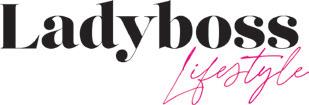

Notes from a Farm Kid Turned Strategy Pro
By Jordan Woods
If you ask Jolene Rieck what she does for a living, don’t expect a short answer. She’s a licensed landscape architect, a certified leadership coach, a strategic planner, and the founder of Emergent Strategies Group in Bismarck. But her real job? Helping communities organize their people and their potential into something remarkable.
"I'm a farm kid from South Dakota," she said. "My family still farms down there. And I think that upbringing gave me a certain independence and a willingness to jump into new things."
After earning her degree in landscape architecture from NDSU, Jolene spent two decades in Billings, Montana, where she ran her own design firm, Peaks to Plains Design. She focused on parks, transportation planning, community development, and anything that needed someone to connect the dots. In 2018, she was recruited to join North Dakota’s state government as the deputy director of parks. It took three tries to get her to say yes.
"Eventually, it felt like the right time to move closer to home," she said. "But after a few years, I knew I missed calling my own shots."
Last spring, she launched Emergent Strategies Group, a consulting firm with a broader mission than traditional landscape architecture. Yes, she
still does design work when needed, but her focus now is helping organizations build clarity and momentum.
"A lot of communities think they need a master plan," she explained. "But really, what they need is someone to help them talk to each other, get aligned, and figure out what steps to take next."
To support that work, Jolene is certified in CliftonStrengths, change management, and Patrick Lencioni's working genius framework. She works with nonprofits, tribal governments, local agencies, and private companies to help leaders step up and organizations move forward.
And if that wasn’t enough, she recently started teaching studio courses for sophomore landscape architecture students at NDSU. "It’s full circle," she says. "Giving back to the profession that gave so much to me."


Jolene’s work is complex, and it doesn’t always come with an easy label.
"Even now, people don’t always know what a landscape architect does," she laughed. "I had someone once lean in and say, 'Electricians wire buildings. What do you do?'"
She does plenty. But the mix of creative and strategic work can be hard to summarize on a business card.
"I always say I’m a jack of all trades, master of a few," she said. "And that’s both the joy and the challenge of it."
Starting a business didn’t feel like a leap to Jolene, more like a natural progression.
"I think that farm kid mentality plays a big part," she said. "You’re always diversifying, trying something new. So starting a business felt pretty natural."
She also has sound advice for aspiring entrepreneurs.
"Take the first step. Fill out the forms. Ask for help. There are resources out there between economic development entities and your peers. Use them. And then be patient. The clients don’t always show up overnight."
While her earlier businesses had employees and a growth mindset, Emergent Strategies is intentionally lean.
"This time around, I want to stay small but go broad," she said. "We have so much talent here in the Upper Midwest. I want to bring that to a bigger stage."
That means expanding her client base outside the region and taking lessons of smalltown resilience and smart community design to other parts of the country
Outside of consulting and teaching, Jolene is outdoors as much as North Dakota weather allows.
"I love being outside. I go back to the farm whenever I can. There’s a particular pasture I love. I lay in the grass and watch the clouds. It’s my reset button."
She also loves gardening (her yard is a mix of wildflowers and pollinator-friendly grasses), boating, and vacationing back to Montana.
Jolene Rieck helps people bring their best ideas to life. Whether she’s teaching students or mapping out a vision for a nonprofit, her ultimate goal is to help her clients be the best they can be.
"Being an entrepreneur is hard," she said. "But the rewards? They’re beyond worth it."

By Michael Danielson, Veterans Business Outreach Specialist
The Veterans Business Outreach Center (VBOC) program is designed to provide entrepreneurial development services such as business training, counseling, and resource partner referrals to transitioning service members, veterans, National Guard and Reserve members, and military spouses interested in starting or growing a small business. U.S. Small Business Administration (SBA) has 22 organizations participating in this cooperative agreement and serving as VBOCs.
Veterans across the United States are demonstrating that military service is more than just a chapter in life, it is a foundation for leadership in the world of business. As more former service members enter the realm of entrepreneurship, there is one defining trait that sets them apart: mission-driven leadership. Rooted in discipline, strategic thinking, and a strong sense of duty, this approach to business management is helping veteran-owned companies grow, adapt,
and succeed in competitive markets. From logistics and cybersecurity to retail and professional services, veteran entrepreneurs are showing that the same qualities that made them effective in the armed forces, resilience, clarity of mission, and the ability to lead under pressure, are equally powerful in the world of small business ownership.
According to data from the U.S. Small Business Administration, approximately 1.76 million businesses in the United States are veteran-owned, making up about 6% of all U.S. businesses. These companies are responsible for employing over 4 million Americans and generating more than $1 trillion in annual revenue. This economic footprint continues to grow as post-9/11 veterans increasingly turn toward entrepreneurship. The trend is supported by a surge in educational programs, financing opportunities, and national campaigns promoting veteran-owned businesses. Programs and resources have emerged to help ease the transition from military service to business leadership, reflecting a national recognition of the value veterans bring to the entrepreneurial ecosystem.
At the core of their approach is mission-driven leadership, a concept deeply ingrained in military training. It is centered on the idea that every action taken serves a clear and purposeful goal. In business, this translates into a leadership style that emphasizes integrity, long-term

vision, and team cohesion. Veterans are trained to operate with a well-defined mission. They learn to break down complex objectives into achievable tasks, align team members with shared goals, and maintain focus even under pressure. This level of strategic planning and execution is directly applicable to running a business where clear vision and measurable goals are essential. Entrepreneurship requires swift decision-making, often with incomplete information. Veterans are accustomed to this challenge. In military contexts, adaptability under pressure is a survival skill. That same capacity allows veteran business leaders to pivot when market conditions change and to approach uncertainty with confidence rather than hesitation.
Military service also cultivates a deep understanding of teamwork, trust, and mutual accountability. Veterans bring a team-first mindset to their business operations, often leading to strong organizational cultures where employees feel valued and aligned. These environments foster loyalty, reduce turnover, and drive performance. They also excel in establishing and maintaining systems that support consistent performance. This operational discipline ensures that small business functions such as budgeting, logistics, and quality control are handled with precision and efficiency. Perhaps most importantly,
entrepreneurship, like military service, comes with inevitable setbacks. Veterans are trained to persevere through adversity and maintain composure under stress. These qualities are critical in business, where obstacles are routine, and long-term success often hinges on a leader’s ability to remain focused during crises.
Veterans leave the military with a unique mix of technical and leadership skills; most are directly transferable to small business ownership. These include project management, logistics and operations, strategic planning, financial oversight, and team management. Translating these skills into civilian terms is often the first challenge for aspiring veteran entrepreneurs. However, an increasing number of public and private initiatives are stepping in to support this transition. Recognizing the potential of veteran entrepreneurs, government agencies and nonprofit organizations have developed a robust ecosystem of support. These programs offer training, mentorship, funding, and access to strategic partnerships. Programs such as Boots to Business, Bunker Labs, and the Veteran Business Outreach Centers provide foundational business education. These include courses in business planning, legal structure, marketing, and financial management. Participants also
gain access to networks of fellow veteran business owners and instructors who understand the unique challenges faced during the transition to entrepreneurship.
Veterans often face difficulties securing startup capital, especially if they have limited personal savings or business experience. To address this, the SBA offers veteran-focused loan programs such as the Veterans Advantage loan program, which provides fee reductions and favorable terms. Additionally, certifications like the Service-Disabled Veteran-Owned Small Business status allow eligible businesses to compete for government contracts and access set-aside procurement opportunities. Mentorship is a cornerstone of veteran entrepreneurial success. SCORE is a program that matches veterans with experienced business owners who offer guidance on scaling operations, securing funding, and navigating legal and regulatory frameworks. Peer networks also play a critical role, offering encouragement and sharing best practices. The culture of shared service often translates into a strong sense of solidarity and support among veteran business owners.
Beyond economics, veteranowned businesses contribute to communities in meaningful ways. Their leadership often reflects a
values-based approach rooted in service, ethics, and responsibility. Veteran entrepreneurs are known to prioritize employee well-being, give back to local causes, and promote inclusive hiring practices, particularly hiring other veterans and military spouses. Many also advocate for mental health awareness and trauma-informed workplaces, leveraging their experience to support others in transition. Campaigns like “Buy Veteran” and public directories listing veteranowned businesses have further encouraged consumers to support these businesses as part of a broader movement toward valuealigned purchasing.
Despite their strengths, veteran entrepreneurs still face several significant challenges. The shift from military service to civilian business life can be disorienting. Veterans may find it difficult to adjust to a less structured environment or to navigate unfamiliar business landscapes. Lack of credit history, limited personal networks, or insufficient collateral can hinder access to traditional business loans or investor funding. Many veterans are also unaware of the resources available to them or unsure how to take the first step in starting a business. Additionally, servicerelated trauma and stress can affect focus, confidence, and business stamina. Veteran entrepreneurs
often benefit from integrated wellness programs that address both business and mental health needs.
As the veteran population continues to diversify across age, gender, and ethnicity, the future of veteran entrepreneurship is poised to grow more dynamic. Women veterans represent a fast-growing demographic of new business owners, reflecting broader societal trends toward inclusivity and empowerment. Technology is also reshaping the landscape. Veterans are increasingly entering techrelated industries, applying skills in cybersecurity, software development, and digital marketing to launch scalable, innovative ventures. Government and private sector leaders are recognizing that supporting veteran entrepreneurship not only rewards their service, but it also strengthens local economies, creates jobs, and promotes civic engagement.
Veterans possess an inherent understanding of leadership, shaped by experience and grounded in purpose. Their approach to business is often characterized by a commitment to excellence, clarity of mission, and responsibility to their communities. As the business world grapples with rapid
change and increasing demands for ethical leadership, veteran entrepreneurs stand out as models of resilience and integrity. Their continued success not only honors their service but also enriches the fabric of American enterprise. Veterans are not just starting businesses; they are redefining what it means to lead with purpose. In doing so, they are proving that the mission never truly ends; it just evolves.
701-738-4850
und.edu/dakotasvboc
/dakotasvboc
@DakotasVBOC
4200 James Ray Dr Grand Forks, ND



